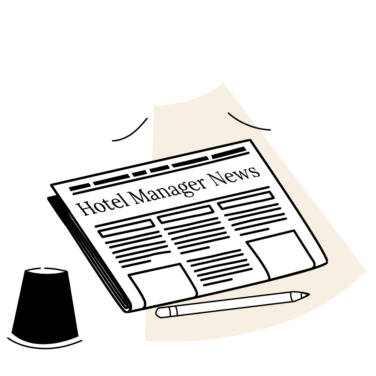In the exciting world of the hospitality industry, a hotel's success relies significantly on the competent and coordinated efforts of its management team.
From the astute General Manager, to the meticulous Executive Housekeeper, and the innovative Sales and Marketing Manager, and all the hotel positions in between, each hotel job plays an integral part in the hotel's overall success.
Buckle up, this article is going to be a fun one as we explore an overview of the essential hotel management positions. We will also touch on their responsibilities and contributions, all for the pursuit of delivering exceptional hospitality creating unforgettable memories for their guests!
Without further ado, here are ten crucial hotel management roles that significantly contribute to a hotel's success:
1. General Manager/Managing Director
The General Manager or Managing Director's role is to ensure the overall success and smooth functioning of the hospitality establishment.
The primary duty and responsibilities of a General Manager involves:
- providing strategic leadership to the whole management team
- overseeing all facets of the hotel's operations to achieve financial and service objectives.
- working closely with department heads and devise business strategies aimed at enhancing guest satisfaction, driving revenue, and establishing a positive reputation in the hotel industry.
- accountability for upholding high standards of service and hospitality. They actively address guest feedback and reviews, ensuring guest satisfaction and loyalty.
- acting as ambassadors for the hotel, engaging with guests, fostering relationships with key partners and stakeholders, and cultivating a positive image of the Hotel Brand within the tourism industry.
Apart from guest relations, General Managers also play a major role in human resources matters, often involved in hiring and training management staff. To streamline these complex tasks, GMs would typically explore advanced hotel management software solutions to achieve optimal operational efficiency.
Financial management is another critical aspect of their role, encompassing budgeting, expense control, revenue management, and financial reporting. Striking a balance between exceptional guest experiences and a profitable hotel remains a continuous challenge that General Managers adeptly navigate to secure the hotel's long-term success.
2. Front Office Manager
The hotel front office manager holds quite an important role in ensuring the smooth operation of the hotel's lobby and reception area as well as being the central point of contact for guests
The primary duty and responsibilities of a Front Office Manager involves:
- Overseeing the assistant manager, front desk, guest services staff, and concierge, providing guidance and support to ensure exceptional customer service.
- Managing guest check-ins and check-outs, managing reservations, and ensuring accurate billing procedures.
- Addressing guest inquiries and complaints promptly and professionally. Their goal will be to resolve any issues that may arise during a guest's stay, while the guest is still in house.
- coordinating with other hotel departments, such as housekeeping and maintenance, to ensure rooms are prepared and well-maintained.
Their ultimate goal is instilling high quality customer service skills to their team to ensure guests have a pleasant and seamless experience from arrival to departure, and that all guests needs are being met, leaving a lasting positive impression and memorable moments that will keep the guests returning.
To ensure smooth operation and guest satisfaction, exploring the best hotel front desk software can be a game-changer in managing guest check-ins and reservations.
3. Housekeeping Manager/Executive Housekeeper
The executive housekeeper, also known as the housekeeping manager have the responsibility of overseeing the cleanliness and maintenance of the hotel rooms, public areas, and facilities.
The primary duty and responsibilities of a Housekeeping Manager involves:
- supervising the housekeeping staff and ensure high standards of cleanliness and efficiency.
- scheduling and coordinating the cleaning of guest rooms and common areas. They make sure that all rooms are properly cleaned, sanitized, and stocked with essential amenities, creating a comfortable, memorable and inviting environment for guests.
- manages the inventory of cleaning supplies and equipment, maintaining adequate stock for the housekeeping team.
- training new room attendants, equipping them with the skills needed to perform their job properly.
- conducting regular performance evaluations to motivate their team and maintain high standards of cleanliness and professionalism
Effective coordination between front office and housekeeping is also super vital. Utilizing specialized software for housekeeping management can significantly enhance this collaboration, ensuring a seamless guest experience.
By ensuring a clean and well-maintained hotel property, the housekeeping manager significantly contributes to guest satisfaction and the hotel's reputation.
4. Food & Beverage Manager
The Food & Beverage (F&B) Manager will oversee the smooth and efficient operation of all dining and beverage services within a hotel.
The primary duty and responsibilities of a Housekeeping Manager involves:
- managing and coordinating all the F&B team members, including the executive chef, servers, bartenders, and support staff.
- hiring, training, and supervision of employees, ensuring that all staff members are well-versed in food safety regulations and delivering impeccable customer service.
- working closely with the culinary team to curate diverse and enticing menus, catering to the varying tastes and preferences of guests.
- setting budgets, controlling costs, and monitoring inventory levels.
For optimal inventory management, many F&B Managers are turning to solutions like hotel inventory management software, which aids in maintaining the balance between supply and demand.
Their responsibilities also extends beyond merely overseeing the daily operations of hotel restaurants, room service, bars, and banquet facilities. A really competent F&B Manager is responsible for developing and implementing strategies to enhance the guest dining experience, while still upholding high standards of service.
They will also work closely with the sales and marketing team and the banquets department to plan and execute special events, weddings, and holiday seasons.
5. Sales & Marketing Manager
A Sales & Marketing Manager's responsibility is developing and executing creative and detailed sales and marketing strategies to attract new customers, retain existing ones, and ultimately increase the hotel's revenue.
The primary duty and responsibilities of a Sales & Marketing Manager involves:
- developing sales plans and targets - identifying the key markets and potential guests and clientele
- proactively engage in the development by seeking out corporate clients, travel agents, event planners, and other potential partners to establish these relationships.
- negotiating contracts, setting competitive pricing, and ensuring customer satisfaction.
- keeping a finger on the pulse of the tourism market trends and what their competitors in the hotel industry are doing to adapt to new sales strategies and staying ahead in the industry.
- overseeing the creation and execution of the hotels marketing campaigns, including digital, print, social media, and email marketing.
- designing promotional materials, advertisements, and engaging content to capture the attention of potential guests.
Ultimately, the success of a hotel's sales and marketing efforts heavily relies on the Manager's ability to understand market demands, create compelling value propositions, and establish a strong brand presence.
The Sales & Marketing Manager works closely with the hotel's management team to streamline marketing efforts with the daily workings of the hotel.
6. Human Resources Manager
While most of the management positions have certain elements in dealing with Hotel Guests, The Human Resources (HR) Manager instead, focuses their attention on the hotel staff.
The primary duty and responsibilities of a HR Manager involves:
- recruitment, selection, and onboarding of qualified candidates to fill vacant positions.
- working closely with the department heads to identify their staffing needs and develop job descriptions, while also implementing effective recruitment strategies to attract top talent.
- conducting interviews, assess applicants, and make hiring decisions, all while ensuring compliance with labor laws and hotel policies.
- onboarding training and development programs
- overseeing orientation sessions to familiarize new hires with the hotel's culture, policies, and procedures, setting them up for success in their roles.
- ongoing training initiatives to improve employees' skills and knowledge, promoting career growth within the organization.
- monitoring employee performance and conduct regular evaluations to provide feedback and identify areas for improvement.
While this may appear to be less fun or less glamorous, it really is still an exciting job. They are responsible for managing the workforce and ensuring the smooth functioning of the hotel's personnel.
Employee relations and engagement are another essential aspect of the HR Manager's responsibilities. They address any workplace issues, mediate conflicts, and enforce disciplinary actions when necessary, all while maintaining a fair and supportive work environment.
7. Financial Controller
The Financial Controller manages the hotel's accounting operations, including accounts payable, accounts receivable, and payroll.
The primary duty and responsibilities of a Financial Controller involves:
- preparing and analyzing financial statements, including income statements, balance sheets, and cash flows through a hotel accounting software.
- assessing a hotel's financial performance, identify areas for improvement, and making informed decisions to optimize profitability.
- working closely with the hotel's management team to develop and monitor budgets, ensuring that expenses are controlled, and revenue goals are met.
- overseeing internal controls and financial audits
- implementing policies and systems for the hotel's assets, preventing fraud, and ensure compliance with financial regulations.
A Financial Controller makes sure their team is working hard to maintain accurate and up-to-date financial records.
In summary, the Financial Controller in a hotel is responsible for maintaining the hotel's financial health. Their role is pivotal in maintaining financial stability, allowing the hotel to operate efficiently.
8. Revenue Manager
The primary responsibility of a Revenue Manager is to analyze market trends and patterns, and competitor strategies to develop pricing and inventory management strategies that ensure the hotel achieves its revenue goals.
The primary duty and responsibilities of a Financial Controller involves:
- monitoring room rates and inventory availability in real-time (and adjusting where needed)
- utilizing revenue management software and data analytics to forecast demand and adjust pricing based on factors like seasonal trends, special events, and customer booking behaviour.
- balancing supply and demand, ensuring the hotel achieves optimal occupancy levels and maximizes room revenue.
- analyzing the performance of different segments and distribution channels, such as online travel agencies (OTAs), direct bookings, and corporate accounts.
- identifying high-value customer segments and target them with tailored promotions and packages to drive more profitable bookings.
- working with the marketing team to develop targeted campaigns and promotions that align with the hotel's revenue objectives.
The Revenue Manager will work closely with various departments, including sales, marketing, and operations, to make decisions that drive bookings and revenue.
Really when it comes down to it, the Revenue Manager is the key player in driving revenue and optimizing profitability. Through data analysis, pricing strategies, and demand forecasting, they ensure the hotel remains competitive in the market, achieves high occupancy rates, and maximizes revenue potential across various distribution channels.
9. Security Manager
The Security Manager is responsible for maintaining a safe and secure environment for guests, employees, and property.
The primary duty and responsibilities of a Financial Controller involves:
- implementing and overseeing comprehensive security protocols and procedures, aimed at preventing potential threats and ensuring the safety of all guests and employees.
- collaborating with other departments, such as front office, housekeeping, and engineering, to ensure seamless coordination to security standards throughout the hotel.
- conducting daily risk assessments and identify vulnerabilities within the property
- developing security plans tailored to the hotel's layout and needs, including measures to prevent theft, vandalism, and unauthorized access.
- managing a team of security personnel, providing training, guidance, and supervision to ensure efficient and professional execution of their duties.
Security Manager plays an important role in emergency preparedness and response. They create contingency plans for various situations, such as fires, natural disasters, and medical emergencies, and conduct regular drills to ensure staff members are well-prepared to handle crises effectively.
In the event of an incident, the Security Manager leads investigations, gathers evidence, and cooperates with law enforcement to resolve issues and ensure appropriate actions are taken.
10. Chief Engineer
The Chief Engineer in a hotel oversees all engineering and maintenance operations, ensuring the hotel's physical infrastructure functions efficiently and safely.
The primary duty and responsibilities of a Chief Engineer involves:
- Leading a team of technicians and maintenance workers, providing training, and delegating tasks effectively.
- Ensuring all hotel facilities, including rooms, common areas, and technical systems, are in optimal condition.
- Establishing and maintaining safety standards to ensure guest and staff safety, including fire safety and emergency procedures.
- Controlling costs related to maintenance, repairs, and upgrades while ensuring quality standards are met.
- Continuously updating knowledge and skills to incorporate the latest technology and sustainable practices in hotel operations.
Their role is crucial in maintaining a comfortable and secure environment for guests and staff.
Conclusion
Hotel management positions really do offer a world of excitement and endless possibilities. The dynamic and fast-paced nature of the hospitality industry provides a fun experience for those involved in managing hotels.
From creating exceptional guest experiences to overseeing diverse teams and engaging in strategic decision-making, hotel management teams are continuously challenged to adapt and innovate. The consistency of optimizing guest satisfaction, revenue, and maintaining impeccable standards keeps hotel managers motivated and inspired.
Ready to learn more? Elevate your professional edge in hospitality & hotel management by subscribing to our newsletter for a curated blend of expert advice, industry news, and success secrets!



